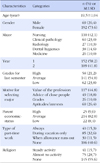Abstract
Purpose
The aim of this study was to identify factors affecting student adjustment to college among students in health colleges (Nursing, Clinical Pathology, Radiology, Dental Hygienics, Medicine).
Methods
The participants in this study were 261 students in Daejeon city. Data were collected from October 5 to October 14, 2014. A structured questionnaire was used for data collection and data was analyzed using the SPSS/WIN program.
Results
Career attitude maturity, calling and work as meaning positively correlated with student adjustment to college. The significant predictors of student adjustment to college were career attitude maturity, calling, always working part-time, major in medicine and average grade for the last semester.
Conclusion
These findings suggest that adjustment to college for students in health colleges is linked to career attitude maturity, and calling. College organization should develop a curriculum fostering a calling which will promote student adjustment to college and graduate health care professionals with desirable attitudes.
Figures and Tables
References
1. Lee KH, Han JC. Study on validation of career attitude. J Career Edu Res. 1997; 8:219–255.
2. Song HS, Hong HY. The influence of social support, career decision-making autonomy on career preparation behaviors: The mediating effect of career decision-making self-efficacy. Korean J Couns. 2010; 11(3):1325–1350. DOI: 10.15703/kjc.11.3.201009.1325.
3. Young RA, Valach L. The construction of career through goaldirected action. J Vocat Behav. 2004; 64:499–514. DOI: 10.1016/j.jvb.2003.12.012.
4. Park JH, Yoo SK. Exploring the mediating effects of career decision-making self-efficacy and work hope in the relationship between calling and career attitude maturity among college students. Korean J Couns. 2012; 13(2):543–560. DOI: 10.15703/kjc.13.2.201204.543.
5. Dik BJ, Duffy RD. Calling and vocation at work: Definitions and prospects for research and practice. Couns Psychol. 2009; 37:424–450. DOI: 10.1177/0011000008316430.
6. Shim Y, Yoo SK. Development and Validation of the Korean Version of the Calling and Vocation Questionnaire (CVQ-K). Korean J Couns Psychother. 2012; 24(4):847–872.
7. Peterson C, Park N, Hall N, Seligman MEP. Zest and work. J Organ Behav. 2009; 30:161–172. DOI: 10.1002/job.584.
8. Wrzesniewski A, McCauley C, Rozin P, Schwarts B. Jobs, careers and calling: People's relations to their work. J Res Pers. 1997; 31:21–33. DOI: 10.1006/jrpe.1997.2162.
9. Serow RC. Called to teach: A study of highly motivated preservice teachers. J Res Dev Edu. 1994; 27:65–72.
10. Elangovan AR, Pinder CC, Mclean M. Calling and organizational behavior. J Vocat Behav. 2010; 76:428–440. DOI: 10.1016/j.jvb.2009.10.009.
11. Lee JY. The change of juvenile's work value. J Vocat Edu Res. 2006; 25(3):163–181.
12. Kim MA, Lim JY, Kim SY, Kim EJ, Lee JE, Ko YK. Influencing factors on nursing students' career attitude maturity. J Korean Acad Psychiatr Ment Health Nurs. 2004; 13(4):383–391.
13. Chang KM. The influence of university students' career decision level and academic self-efficacy on their adjustment to university. Korean J Couns. 2005; 6(1):185–196.
14. Duffy RD, Manuel RS, Borges NJ, Bott EM. Calling vocational development and well being: A longitudinal study of medical students. J Vocat Behav. 2011; 79:361–366. DOI: 10.1016/j.jvb.2011.03.023.
15. Duffy RD, Allan BA, Dik BJ. The presence of a calling and academic satisfaction: Examining potential mediators. J Vocat Beh. 2011; 79:74–80. DOI: 10.1016/j.jvb.2010.11.001.
16. Dik BJ, Eldridge BM, Steger MF, Duffy RD. Development and validation of the calling and vocation questionnaire (CVQ) and brief calling scale (BCS). J Career Assess. 2008; 20:242–263. DOI: 10.1177/1069072711434410.
17. Steger MF, Dik BJ, Duffy RD. Measuring meaningful work: The work and meaning inventory (WAMI). J Career Assess. 2012; 20:322–337. DOI: 10.1177/1069072711436160.
18. Lee JS, Seo YS. The relation between employees job burnout and job satisfaction: Moderating effects of meaning of work and working environments. Korean J Couns Psychother. 2014; 26(4):1109–1129.
19. Kim HW. The relationship between family system patterns and career decision-making and adjustment to college [master's thesis]. Seoul: Sookmyung Women's University;2005.
20. Baker RW, Siryk B. Measuring adjustment to college. J Couns Psychol. 1984; 31:179–189. DOI: 10.1037/0022-0167.31.2.179.
21. Jang JY, Lee JY. The relationship between perceiving a calling and life satisfaction: The mediating effects of work meaning, living a calling, life meaning, and job satisfaction. Korean J Couns. 2014; 15(1):259–278. DOI: 10.15703/kjc.15.1.201402.259.
22. Jang SH, Yoo SK. The mediating effect of career decision-making self-efficacy on the relationship between work purpose/meaning, parental support and university senior job search behavior. J Hum Underst Couns. 2014; 35(1):1–17.
23. Lee SH, Lee EJ. The influences of gender role identity, and gender role attitude on career decision-making self-efficacy and career maturity. Korean J Couns. 2009; 10(4):2137–2151. DOI: 10.15703/kjc.10.4.200912.2137.
24. Koo HY, Park HS. Career Attitude Maturity and Its Predictors of University Students. Korean J Couns. 2005; 6(2):373–385.
25. Cho IY. The relationship of career identity, major satisfaction and college adaptation of nursing freshmen. J Korea Acad Ind Coop Soc. 2014; 15(5):2937–2945. DOI: 10.5762/kais.2014.15.5.2937.
26. Guo Y, Guan Y, Yang X, Xu J, Zhou X, She Z, et al. Career adaptability, calling and the professional competence of social work students in China: A career construction perspective. J Vocat Behav. 2014; 85:394–403. DOI: 10.1016/j.jvb.2014.09.001.
27. Yugo JE. The role of calling in emotional labor [dissertation]. Bowling Green: Bowling Green State University;2009.
28. Sparks JR, Schenk JA. Explaining the effects of transformational leadership: An investigation of the effects of higher-order motives in multilevel marketing organizations. J Organ Behav. 2001; 22:849–869. DOI: 10.1002/job.116.
29. Duffy RD, Dik BJ, Steger MF. Calling and work related outcomes: Commitment as a mediator. J Vocat Behav. 2011; 78:210–218. DOI: 10.1016/j.jvb.2010.09.013.




 PDF
PDF ePub
ePub Citation
Citation Print
Print







 XML Download
XML Download